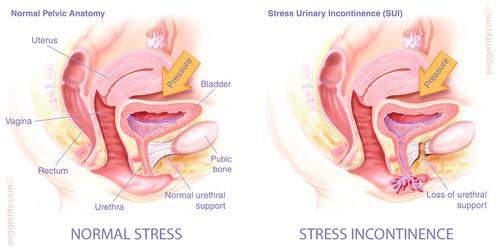Why Do You Pee When You Cough?
Uncontrollable coughing produces jerks in our body cavity. This sudden, violent jerk distends our urinary bladder as the chest diaphragm expands and contracts. It makes the pelvic floor muscles around the bladder to relax involuntarily allowing the bladder to expand or distend momentarily. The instantaneous act relaxes the pelvic muscles around the urethra. The urethra loosens and opens up, allowing the droplets of urine to escape from the urinary bladder.
In scientific terms, we call this phenomenon of involuntary passage of urine in 2-3 drops while one coughs or undergoes sudden jerky movements as stress incontinence. So, now that it's all about "stress incontinence,” let's explore its causes.

Main Causes of Stress Incontinence
1. Childbirth Loosens Muscle Control in Pelvic Region
Giving birth involves labor which is one of the most painful experiences of mankind. However, the new mom may also suffer from snapping and damage of pelvic and sphincter nerve tissues during vaginal and forceps delivery. This reduces the contraction capability of the pelvic floor muscle leading to pee inconsistency.
2. Pelvic Surgery Reduces Pelvic Region Muscles
Pelvic surgery such as hysterectomy in women involves the removal of the uterus or pelvic muscles, which then alters the support of both the bladder and urethra. This support wanes due to a loss in tissues and muscles during the surgery and thus leads to the occurrence of urine incontinence.
3. Prostate Surgery Removes Sphincter Support
Prostate surgery involves removal of the prostate gland. The sphincter muscle tightly holding the urethra lies just below this prostate gland. Removal of this gland (prostatectomy) releases pressure on sphincter, which then loosens up. This further loosens the grip of sphincter muscle leading to droplets of urine to pass out from bladder uncontrollably.
4. Obesity Increases Pressure on the Abdomen and Bladder
People who suffer from obesity run a high risk for suffering from stress incontinence as the excess body weight puts a high amount of constant pressure on the pelvic organs.
5. Smoking Causes Incessant Coughs
Continuous cough, which often happens due to smoking, creates pressure on the bladder. Due to bladder reaction, the floor pelvic muscle loosens to let bladder sink lower in order to absorb pressure. This in turn relaxes the sphincter muscle, which lets out urine. This is also the reason to one of your most inquisitive questions: why do I pee when I cough continuously?
6. Neurological Problems Damages the Nerves of Muscles
Neurological diseases like Parkinson's disease and Multiple Sclerosis damage the nerve cells. Nerve activity through the spine is compromised. Muscles become stiff and inflexible, causing improper nerve signals. Bladder, sphincter and pelvic floor muscles contract or relax at any time of the day without any control.
What Are the Treatments?
1. Proven Non-Surgical Treatment
- Exercises Help Control in Peeing When Coughing
Kegel pelvic floor muscle exercises help in reducing stress incontinence during coughs. These set of procedures helps in regaining the strength and contraction capability of muscles surrounding the bladder, bowels, and uterus. Pelvic and sphincter muscles workability is brought back. The best routine consists of 15-20 contractions per set to be done in a batch of 3 sets per day over three months.
- Bladder Training is Controlling Urge to Pee
Maintain a regular schedule of voiding the bladder. The time gap to empty bladder depends on the severity of stress incontinence.
- Weight Loss
Being overweight can create intense pressure on the bladder. Losing weight is one of the best options to decrease bladder pressure and reduce the unwanted contraction of the bladder.
- Quitting Smoking
If you're coughing so hard you have to pee,, then it's high time you dump your smoking habits. It reduces coughs and unwanted jerky movement of bladder.
- Reducing Alcohol Consumption
Alcohol and caffeine-filled drinks send confusing signals to the bladder and sphincter muscle. This results in unwanted bladder contraction or loosening of urethra.
2. Known Surgical Methods
- Sling Method Increases Support for Bladder
It uses self and human donor tissues and muscles to create a support for sagging urethra. This hammock of tissues supporting upper urethra is attached to the pubic bone.
- Insertion of Bulking Agents
Collagen, polysaccharides, or other medical gels are injected in the upper lining of urethra to increase its mass and the capability of closing the bladder mouth.
Summary
It's true that stress continence can be a social block for anybody and can often lead you to ponder over why do I pee when I cough? But with help of exercises, non-surgical methods as described, you can look up to a much better quality of life. For exploring more on the same, kindly refer to the shared video below:
YOU MAY LIKE
-
Amazing Facts About Pain in the Back and Frequent Urges to Urinate
-
Why Does It Hurt When I Pee
-
6 Effective Ways to Treat Urinary Tract Infection (UTI)
-
Ways to Avoiding Urinary Tract Infections
-
Vital Tips to Prevent Kidney Stones
-
Best Ways to Get Rid of Kidney Stones
-
Abdominal Pain and Frequent Urination Female: Causes and Tips
-
Want to Pee but Can’t? Reasons and Solutions Why This Could Happen
-
Causes and Tips for White Blood Cells in Urine
-
Why the Epithelial Cells Appear in Urine?
